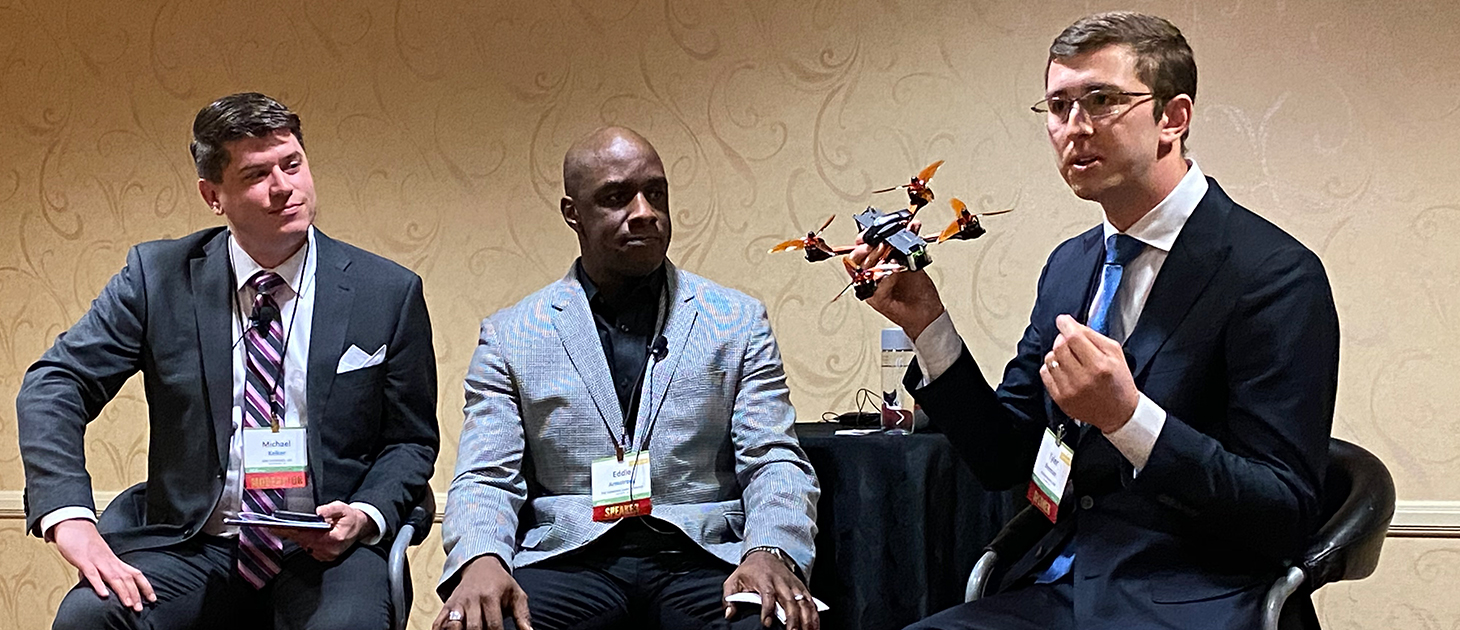Leaders from Cannabis and Drone Industries Dispel Regulatory Myths
Cannabis and drones face different regulatory hurdles from regulators, but business leaders in both industries agree they're behind the times.

When Eddie Armstrong, CEO and chairman of Cannabis Capital Group, a medical cannabis consulting and advisory business, told his grandmother about the firm he and his partners were founding, she did not hesitate to voice her concern.
“She said it was the worst idea we could ever come up with,” he said during a panel session about regulation at ACG Chicago’s Middle Market Manufacturing Conference, where Armstrong spoke alongside Tyler Brennan, CEO of drone retailer Race Day Quads at ACG Chicago’s Middle Market Manufacturing Conference on Feb. 25.
Although cannabis and drones face different regulatory hurdles, both business leaders agreed the government is behind the times.
For Armstrong, decreasing federal enforcement and an increasing push by states to legalize medical and consumer-grade cannabis has made for a complicated environment for his Chicago-based business. “We are operating in a consistently inconsistent world,” he said.
While more companies are emerging to cultivate, process and sell cannabis nationwide as states roll back decades-old prohibitions, federal inaction and restricted access to capital continues to limit cannabis companies’ growth.
Although cannabis and drones face different regulatory hurdles, both business leaders agreed the government is behind the times.
Yet there is a common misunderstanding about the ability of cannabis businesses to tap into banking networks, says Armstrong, who previously served in the Arkansas state legislature and has worked with cannabis industry groups in Washington. Despite strict federal restrictions for large banks, small ones are willing lend. “They’re taking an active role in this,” he said.
He’s confident that policy will adapt in the near future to accommodate the changes in the cannabis industry as it expands into health, beauty and food. “It’s no longer thinking about cannabis, as my grandma said, as just ‘smoking dope.’”
When Armstrong offered his grandmother CBD-infused lotion to help treat pain caused by arthritis, her attitude began to change. Similar shifts in public opinion about regulation could also be in store for cannabis in the near future.
Drones face their own set of misconceptions, according to panelist Tyler Brennan. Driven by concerns that small, remote-controlled aircraft could violate privacy, local governments across the country have begun restricting their use, while federal regulators like the Federal Aviation Administration are considering their own rules.
Brennan has heard the privacy refrain against drones before, and he offered a rebuke to the claim. “A drone camera cannot see through a window,” he said. With reflection and poor camera quality, “it’s just not possible.”
A 26-year-old who started his company five years ago, Brennan runs Orlando, Florida-based Race Day Drones remotely from his home in North Carolina, overseeing a staff of more than 25 employees. He’s also a full-time combat pilot in the U.S. Air Force.
In December, the FAA issued a proposed rule that would require drones to use hardware that will allow authorities to identify them. Brennan is skeptical of the rule’s efficacy—namely, who would enforce it.
Moreover, response to existing regulations for drones may indicate how future legislation will be received.
Three years ago, most drone owners complied with a rule requiring drones to have an identification number, Brennan said. But the proliferation of affordable drones used by hobbyists has caused the law to be routinely ignored. With no clarification from the FAA or robust enforcement, it’s fallen by the wayside. “There’s no officer or FAA agent going out there and saying ‘Hey, show me your 12-digit registration number.’ That’s just not happening,” Brennan said. Future regulation may also go unheeded.
Luckily for Brennan, most of his company’s products are unlikely to be affected because regulations generally apply to unmanned aircraft when they exceed 55 pounds. Equipment that falls below that threshold is considered “model aviation”—a designation for remote-controlled planes—which has much lighter restrictions.
Brennan hopes that if groups representing model aviation push hard enough, small consumer drones won’t be impacted by future rules. Hobby associations like the Academy of Model Aeronautics asked members to submit comments to the FAA to make sure model aviation exceptions remain in place.
But Brennan admits he’s keeping an eye on how future rules shake out. “The proposed regulations are really aimed at Amazon and FedEx,” he said. “We’re just caught in the cross fire.”

Benjamin Glick is ACG Global’s marketing and communications associate.


